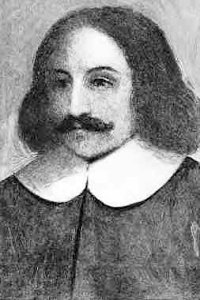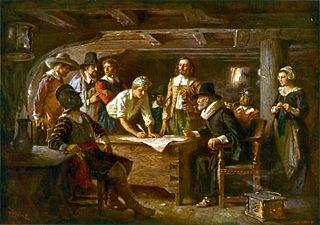
William Bradford was an English Puritan Separatist originally from the West Riding of Yorkshire in Northern England. He moved to Leiden in Holland in order to escape persecution from King James I of England, and then emigrated to the Plymouth Colony on the Mayflower in 1620. He was a signatory to the Mayflower Compact and went on to serve as Governor of the Plymouth Colony intermittently for about 30 years between 1621 and 1657. He served as a commissioner of the United Colonies of New England on multiple occasions and served twice as president. His journal Of Plymouth Plantation covered the years from 1620 to 1646 in Plymouth.

William Brewster was an English official and Mayflower passenger in 1620. He became senior elder and the leader of Plymouth Colony, by virtue of his education and existing stature with those immigrating from the Netherlands, being a Brownist.

Christopher Martin and his family embarked on the historic 1620 voyage of the Pilgrim ship Mayflower on its journey to the New World. He was initially the governor of passengers on the ship Speedwell until that ship was found to be unseaworthy, and later on the Mayflower, until replaced by John Carver. He was a signatory to the Mayflower Compact. He and his family all perished in the first winter at Plymouth Colony.

James Chilton was a Leiden Separatist passenger on the historic 1620 voyage of the ship Mayflower and was the oldest person on board. Upon arrival in the New World, he was a signer of the Mayflower Compact. James Chilton was one of the earliest to die that winter, perishing within the following month.

Thomas Tinker and his family, comprising his wife and son, came in 1620 as English Separatists from Holland on the historic voyage of the Pilgrim Ship Mayflower. He was a signatory to the Mayflower Compact but he and his family all perished in the winter of 1620/1621, described by Bradford as having died in "the first sickness."

Edward Fuller was a passenger on the historic 1620 voyage of the ship Mayflower. He was a signatory to the Mayflower Compact and perished with his wife soon after the passengers came ashore to their new settlement at Plymouth.

John Tilley and his family were passengers on the historic 1620 voyage of the Mayflower. He was a signatory to the Mayflower Compact, and died with his wife in the first Pilgrim winter in the New World.

Samuel Fuller was a passenger on the historic 1620 voyage of the Pilgrim ship Mayflower and became a respected church deacon and the physician for Plymouth Colony.

Edward Tilley traveled in 1620 on the historic voyage of the ship Mayflower as a Separatist member of the Leiden, Holland contingent. He was a signatory to the Mayflower Compact, and died with his wife in the first Pilgrim winter in the New World.
Samuel More (1593–1662) was an English man who was at the centre of two historical incidents in 17th-century England. In the first, he arranged for the removal of his children to the New World aboard the Mayflower; later, during the English Civil War, a garrison under his command was massacred by besieging forces.
Jacob Blakeway was at the centre of a historic incident in seventeenth century England which caused a great scandal and led to the four More children being sent to America on the Mayflower in 1620.

William White was a passenger on the Mayflower. Accompanied by his wife Susanna, son Resolved and two servants, and joined by a son, Peregrine, on the way, he traveled in 1620 on the historic voyage. He was a signatory to the Mayflower Compact and perished early in the history of Plymouth Colony.

Resolved White was a passenger on the Pilgrim ship Mayflower. In 1620, he accompanied his parents, Pilgrims William and Susanna White, on the journey. He married Judith Vassall, daughter of William Vassall, a founder of the Massachusetts Bay Colony. Later in life White became a notable person of Plymouth Colony.

Moses Fletcher was a Leiden Separatist who came to America on the historic 1620 voyage of the Pilgrim ship Mayflower. He was a signatory to the Mayflower Compact and perished shortly thereafter in the Pilgrims first winter in the New World.

John Turner was a passenger, along with his two sons, on the 1620 voyage of the historic Pilgrim ship the Mayflower. He was a signatory to the Mayflower Compact and perished with his sons that first winter.

John Crackstone was an English Separatist from Holland who came with his son John on the historic 1620 voyage of the Pilgrim ship Mayflower. He was a signatory to the Mayflower Compact, but perished with the first Pilgrims to die the winter of 1620, exact date unknown. His son John later died in his twenties.

William Butten was a young indentured servant of Samuel Fuller, a long-time leader of the Leiden Church. Butten died during the voyage of the Mayflower while traveling with Fuller, who had been appointed doctor for the group. At that time, children and young men were routinely rounded up from the streets of London or taken from poor families receiving church relief to be used as laborers in the colonies. Butten was sick the entire voyage and died at sea when near the coast of New England.

The Mayflower Compact was an iconic document in the history of America, written and signed aboard the Mayflower on November 11, 1620, while anchored in Provincetown Harbor in Massachusetts. The Compact was originally drafted as an instrument to maintain unity and discipline in Plymouth Colony, but it has become one of the most historic documents in American history. It was published in London in Mourt's Relation in 1622, and the authors had added a preamble to clarify its meaning: "it was thought good there should be an association and agreement, that we should combine together in one body, and to submit to such government and governors as we should by common consent agree to make and choose."






